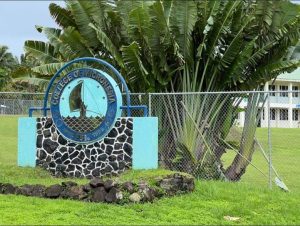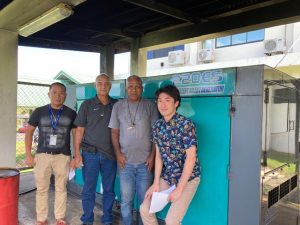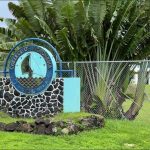Ensuring an emergency power supply for high quality and sustanable educational activities
College of Micronesia - FSM
Products introduced:
DCA-150 + Automatic Transfer Switch
DCA-220 + Automatic Transfer Switch

“Issue”
Unstable power supply and frequent power outages; urgent need to secure emergency power supply facilities at the college itself
The College of Micronesia-FSM is the highest academic institution in the Federated States of Micronesia, with campuses in each state of the federation. Each state branch campus has its own unique characteristics; for example, the Yap Campus also has a Fisheries and Maritime Institute. Many students are from neighboring island countries as well as islanders from that state. Japanese universities also accept students from the college and promote exchanges with them.
The Federated States of Micronesia consists of four states (Yap, Chuuk, Pohnpei, and Kosrae) and 607 islands, and the college campus operates separately on each island where the state capitals are located. For this reason, it was originally possible to attend lectures at other branch campuses online. However, due to the temporary reduction in in-person classes following Covid-19, it suddenly became difficult to meet the new electricity demands, as the increase in the number of online courses also required more computing power than usual at each campus.
The power infrastructure in the Federated States of Micronesia, particularly in Pohnpei, is weak. Public power generation facilities use diesel generators, which are expensive due to fuel transportation costs, etc. Pohnpei’s power generation facilities are especially deteriorated and inefficient, resulting in frequent breakdowns and repair work. In addition, power demand from the industrial sector is increasing, leading to constant power outages.
In some areas, power supply restriction days (planned power outage days throughout the year) are enforced only occasionally, and there is a constant shortage of engineers to operate power plants.
Under such circumstances, an increase in power outages is expected, which could hinder research in the Departments of Agriculture and Food Technology, as well as experiments in the Department of Electronic Engineering. In some cases, students are unable to complete their scheduled courses, which may result in a decline in the quality of education.
In addition, it is anticipated that the work of faculty and staff, as well as everyday studies, will be affected, deeming it essential for the college to own and operate emergency generators.
Issue
- Pohnpei's public power generation capacity was fragile and unstable, causing frequent power outages and worsening the level of education.
- The cost of electricity was also high because Pohnpei is a federal state consisting of several islands.
- Online courses had been offered for some time, but the Covid-19 pandemic led to an increase in the number of such courses, which in turn increased demand for electricity.
- Other industrial sectors were also experiencing an increase in the demand for electricity, and power outages were likely to increase in the future, so the college itself required an emergency power supply.
Solution
- By introducing Denyo's DCA series as emergency power supply equipment, a system was established to quickly supply power to the campus in the event of a power outage.
- Because diesel generators were to be installed outdoors, they had to be designed to be quiet so as not to interfere with classes, and Denyo products met this requirement.
- Fuel efficiency and durability were also requirements, and after installation, the generators have proven to be fuel-efficient and trouble-free, with minimal attention needed from engineers.
- The generators have been in operation at three campuses, with expansion to other campuses in each state also finalized.

“Solution”
Install diesel generators to immediately supply power even in the event of a power outage
The college has also installed solar-powered and other renewable energy generators, but renewable energy generation alone is not enough to handle power outages. In addition, they have proven difficult not only from a cost standpoint, but also in terms of dealing with breakdowns and maintenance.
From a practical standpoint, the college required an emergency power supply system that is both power- and fuel-efficient, robust, long-lasting, and unbreakable; in other words, one with low maintenance and repair costs.
The option that came to mind was an emergency diesel generator. With diesel, power can be generated whenever needed as long as fuel is secured, and the technical staff stationed on campus can respond immediately. The college has a maintenance office with four or five engineers that handle maintenance for a variety of equipment. An advantage in the case of diesel generators is that these engineers can start operating them with little preparation time.
Upon setting out to choose its generators, the college considered products from various manufacturers, and among those made by world-renowned generator manufacturers, Denyo’s DCA series stood out for being highly evaluated by many personnel.
Maintenance Director Francisco Mendiola shared his thoughts as follows.
“The hood design of all of Denyo’s products gave the impression of sturdiness, and we understood from the data presented that they indeed have fairly high durability performance and can withstand heavy wind and rain even when installed outdoors. The design’s level of quietness also proved to be very high. Since the generators were to be installed outdoors, we had to be careful about noise so that they would not interfere with classes. The fact that they are made in Japan was also very appealing. They are sturdy and trouble-free, with good after-sales care in case of failure.”
In addition, the DCA series was found to be appealing because of its stable power supply with a small voltage fluctuation rate, low emissions, and resistance to internal contamination even with many years of use. Another feature that was highly evaluated was its ability to cope with overloads and sudden load fluctuations, thanks to its various sensors and alarms.
Cost-effectiveness was also a major factor, since they were to be installed on several campuses. Therefore, the operating cost as well as usability and safety were also essential requirements. Even if the generators were fuel-efficient, if they were not easy to use and required various safety precautions, more personnel than planned would have to be allocated to operate them. In this respect, Denyo’s products were highly evaluated for being intuitive and easy to operate compared to those of other manufacturers.

Contact us
for more information
Contact us
for more information



